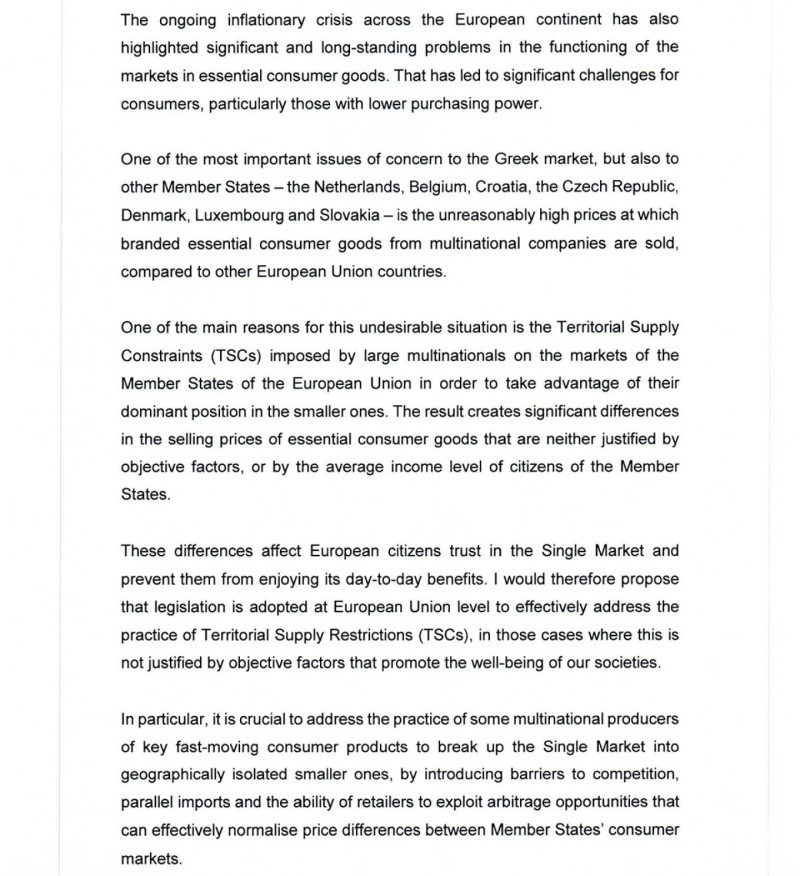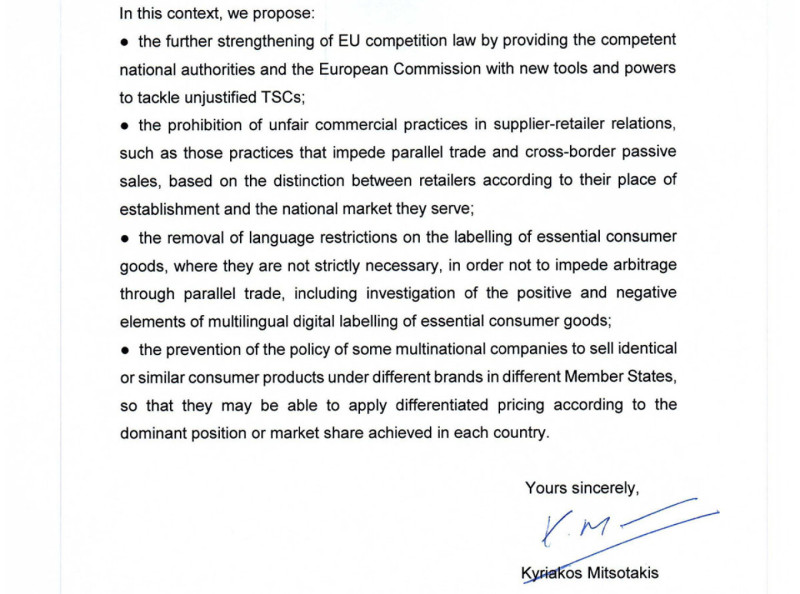According to the European official, “the Commission remains constantly committed to the abolition of unjustified regulatory and non-barriers”
In the letter sent by Kyriakos Mitsotakis to the President of the European Commission, Ursula von der Leyen, a representative of the Commission was appointed. With his letter, the prime minister asks for European interventions for accuracy.
According to the European official, “the Commission remains constantly committed to the abolition of unjustified regulatory and non-barriers to ensure the best functioning of the single market”.
“The Commission will not hesitate to protect consumers (…) While competition enforcement as such cannot address the problem at its root, it can play an important role,” the Commission representative pointed out.
Kyriakos Mitsotakis, who was in Florina on Tuesday, referring to the response of the representative of the Commission, emphasized that “the European Commission answers “yes, you are right” and the opposition criticizes us, because we ask for help in a European and recognized problem . The dialogue at some point in the country must be done with common sense, as we have lost it in the toxicity.”
The Commission representative’s response in detail
“We received the letter from the Prime Minister of the Hellenic Republic, Kyriakos Mitsotakis, addressed to the President of the Commission, Ursula von der Leyen. In accordance with our usual practice, we will respond to the letter in a timely manner. We also welcome the letter, which will be supported by Mario Draghi’s report on the future of European competitiveness and Enrico Letta’s report on the future of the single market.
The Commission remains constantly committed to removing unjustified regulatory and non-regulatory barriers to ensure the best functioning of the single market. Territorial supply constraints (TSCs) amount to non-regulatory barriers to the better functioning of the single market.
The European Commission conducted a study in 2020 which confirmed the existence of these non-regulatory restrictions imposed by suppliers on retailers, preventing them from sourcing in the country of their choice. According to competition law, such agreements are illegal and such unilateral practices are prohibited if the manufacturer has a dominant position in the import market.
The European Commission is examining a number of such cases. The Commission will not hesitate to protect consumers by investigating these cases as a matter of priority. While competition enforcement as such cannot address the problem at its root, it can play an important role.
Several Member States have asked the Commission to look into this issue and identify a single market solution beyond competition rules. The cost of living crisis makes the price issue even more sensitive for consumers.
In the “transition path towards the retail ecosystem” published in March 2024, the Commission proposed to start a dialogue between the stakeholders, i.e. international suppliers of branded products, retailers and consumers, to try to find solutions. In the same way, there should be further discussion with the Member States.”
Mitsotakis letter to Ursula von der Leyen in detail
Dear President of the European Commission,
Dear Ursula,
With this letter I would like to highlight the need for the further deepening of the European Single Market in the politically critical field of protecting consumers and their incomes.
The recent inflationary crisis, which led to a significant erosion of the purchasing power of European citizens, highlighted both the asymmetric power that multinational giants have in terms of the differentiated pricing policy they follow vis-à-vis individual member states, as well as the underutilized collective power of our union.
That is why it is crucial politically, in view of the upcoming European elections, for the EU to demonstrate that it can not only prioritize and set the right priorities based on the problems that concern European societies – and accuracy is undoubtedly one of them – but also to intervene decisively, quickly and effectively to resolve them.
We can take even bolder steps to make the single market work with more competition and transparency in favor of consumers. Only in this way will the citizens of the Union, regardless of the country where they live, be able to enjoy the results of the ambitious joint European project for a Europe inspired by the principles of collectivity, inclusiveness, social cohesion and the common pursuit of improving standard of living of its citizens.
The ongoing acute inflationary crisis, affecting the whole of the European Continent, has highlighted significant and long-term problems in the operation of markets for basic consumer products that have led to the creation of significant challenges for consumers, and especially for those with lower purchasing power.
One of the most important issues that concern the Greek market, but also the markets of other member states such as the Netherlands, Belgium, Croatia, the Czech Republic, Denmark, Luxembourg and Slovakia, are the unreasonably high prices at which they are sold branded basic consumer products of multinational companies compared to other European Union countries.
One of the main reasons that cause this undesirable situation is the Geographical Supply Constraints (Territorial Supply Constraints – TSCs) imposed by large multinational companies between the markets of the member states of the European Union in order to exploit the dominant position they have in the markets, mainly, the smallest of them. The result of this practice is the creation of significant differences in the sale prices of basic consumer products that are not justified by objective factors or the average income level of the citizens of the member states.
I believe that these differences undermine European citizens’ confidence in the Single Market and prevent them from enjoying the benefits of its continued integration into their daily lives. In this context, I propose the adoption of legislation, at the level of the European Union, to effectively deal with the policy of Geographic Supply Restrictions (TSC) where it is not justified by objective factors that promote the well-being of our societies.
In particular, it is critical to address the efforts of some MNCs to fragment the Single Market into geographically isolated markets by introducing barriers to competition, parallel imports and the ability of retailers to take advantage of arbitrage opportunities. ) that can effectively smooth out price differences between the consumer markets of the member states.
In this context we propose:
– The enrichment of EU law on competition protection with provisions that provide new tools and powers to national competition authorities as well as to the European Commission to deal with unjustified TSCs,
– The prohibition of unfair commercial practices in relations between suppliers and retailers based on discrimination between retailers according to their place of establishment and the national market they serve and in particular practices that prevent parallel trade and cross-border passive sales,
– The elimination of language restrictions on the labeling of consumer staples, where they are not absolutely necessary, in order not to hinder arbitrage through parallel trade, or to explore the pros and cons of multilingual digital labeling of staple consumer products.
– The prevention of the policy of certain multinational companies to make available the same or similar consumer products under different brands in different Member States in order to be able to apply differential pricing depending on the dominant position or market share they have achieved in each country”.
Source: Skai
I have worked in the news industry for over 10 years. I have been an author at News Bulletin 247 for the past 2 years. I mostly cover politics news. I am a highly experienced and respected journalist. I have won numerous awards for my work.












